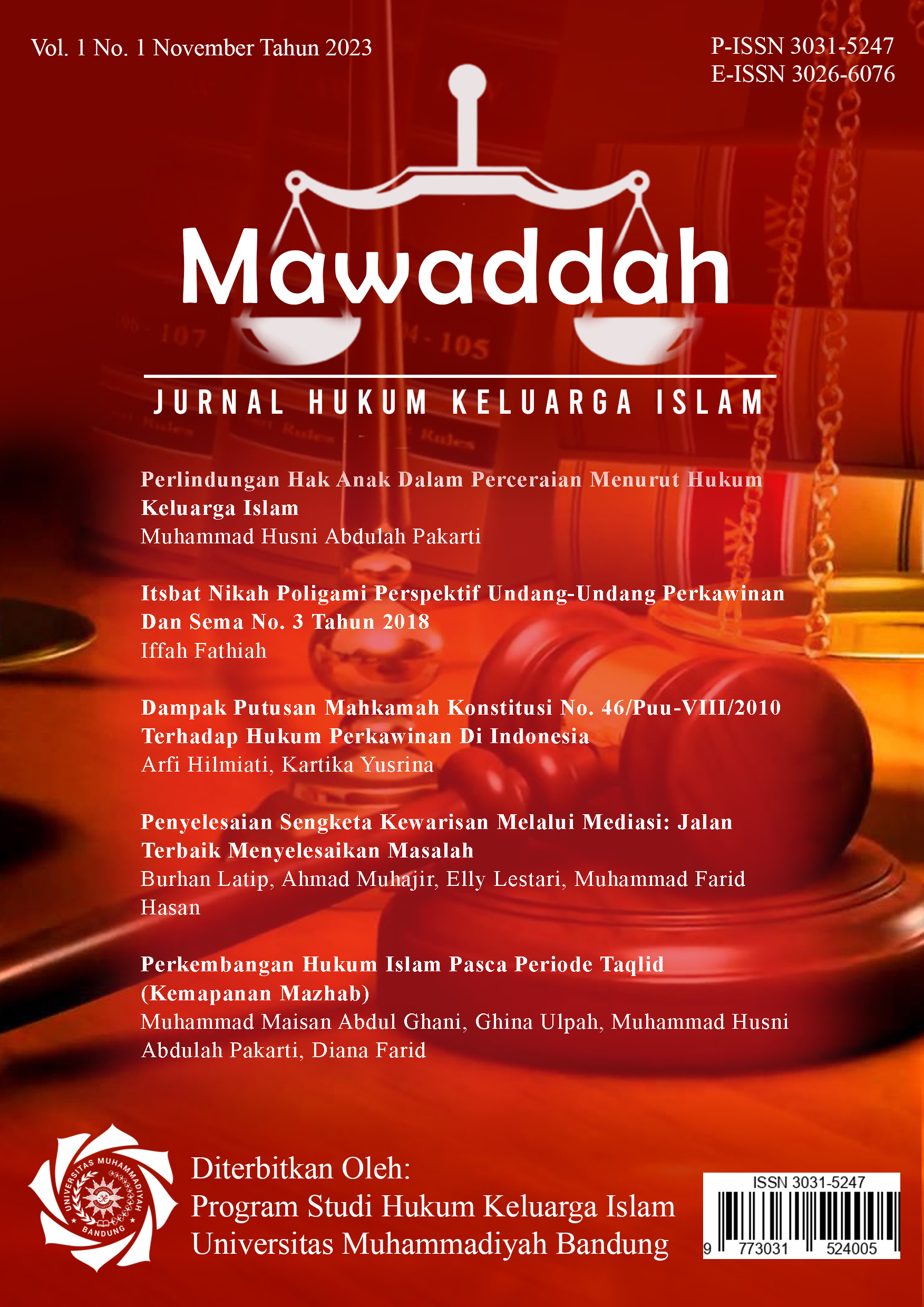PERKEMBANGAN HUKUM ISLAM PASCA PERIODE TAQLID (KEMAPANAN MAZHAB)
DOI:
https://doi.org/10.52496/mjhki.v1i1.5Keywords:
Thought, Islamic law, periodizationAbstract
Islamic law experienced dullness and decline after the period of taklid. However, that period disappeared after Muslims sought a solution so as not to be left behind from the West which was increasingly advanced while Islam was the opposite. The revolution of Islamic thought was present during the progress of Islam after blind taklid, spearheaded by Islamic thinkers of his time, such as Abdul, Sheikh Muhammad as- Sirhindi, Sayyid Ahmad Syahid, Muhammad Abdul Wahab and so on, which made Islamic law and Islamic thought advance again. This research aims to analyze the development of Islamic law after the taqlid period. This research uses a qualitative method with a literature study approach as a data search process. Primary and secondary data are obtained from books, electronic journal manuscripts that have been published in journals that have national and international reputations related to the development of Islamic law during the taqlid period. After the data has been obtained, data analysis is carried out to find answers to the problems raised and after that the real conclusion is drawn. The results showed that Islamic law experienced a period of development, one of which is called the Awakening period which began in the second part of the 19th century until now, with the central figures being Jalaluddin Al-Afghani (1839-1897) and Muhammad Abduh (1849-1905). Their thoughts were heavily influenced by those of Ibn Taymiyyah (1263-1328). The first characteristic is the call to establish Pan Islamism and make comprehensive changes to the Islamic world, especially in the field of utilizing reason over the Qur'an and Sunnah and at the same time releasing ties from the shackles of the madhhab. Mazhab is something common, but excessive bigotry against the mazhab is something that perishes and destroys. Second, the approach to Islamic law through Mazhab Comparison, both the Shafi'i, Maliki, Hanafi and Hambali madhabs plus the Shi'a Mazhab. Comparisons are even made with Western legal systems and other laws. Third, it is characterized by considerable attention from the European and Western world in general to study Islamic law so that they make Islamic law an official subject in the Faculty of Law. Fourth, from the development of Islamic law is the tendency in Muslim countries to return to Islamic Law as seen in the Middle East and in Southeast Asia. Even if the country is not an Islamic state, the law applied in it is Islamic law.
References
Ali, Mohammad Daud, Hukum Islam, Jakarta: PT Raja Grafindo Persada,1990.
Alfian, M. (2020). Pembaharuan dan Progresif dalam Eksistensi Pembinaan Hukum Islam Serta Pranata Sosial. Jurnal Hukum Caraka Justitia, 1(1), 1-20.
Abd Wafi Has, Ijtihad sebagai alat pemecah masalh umat Ilam, Epistemé, Vol. 8, No. 1, Juni 2013.
Budiarti, B. (2017). Studi Metode Ijtihad Double Movement Fazlur Rahman Terhadap Pembaruan Hukum Islam. Zawiyah: Jurnal Pemikiran Islam, 3(1), 20-35.
Djazuli, Ilmu Fiqh, Penggalian, perkembangan, penerapan hukum Islam, Jakarta : Prenada Media,2005.
Djatnika, Rahmat, Perkembangan Ilmu Fiqih Di Dunia Islam. Jakarta: Dept. Agama RI, 1986.
Fitriyani, F. (2010). Organisasi Islam dan pengembangan hukum Islam di Indonesia. Al- Ulum, 10(1), 73-90.
Modern, A. H. P. P. I. PEMIKIRAN PENDIDIKAN ISLAM MUHAMMAD ABDUH (1849-1905 M).
Nur, S. (2007). Ilmu Fiqih: Suatu Pengantar Komprehensif Kepada Hukum Islam.
Tafakur.
Khallaf, Abdul Wahab Khulasah Tarikh Tasyri’ al-Islami terj. Ahyar Aminuddin, Perkembangan Sejarah Hukum Islam. Bandung: CV. Pustaka Setia, 2000.
Khalil, Rasyad Hasan. Tarikh Tasyri’ ( Sejarah Legislasi Hukum Islam ), diterjemahkan oleh Dr. Nadirsyah Hawari, M.A. Jakarta: Amzah, 2009.
Praja. Juhana S. Dkk, Hukum islam diIndonesia. Bandung: Pustaka Rosdakarya Offset, 1991.
Rosadi, A. (2015). Gerakan Salaf. TOLERANSI: Media Ilmiah Komunikasi Umat Beragama, 7(2), 194-205.
Sirrry, Mun’im A. Sejarah Fiqih Islam. Islamabad: Risalah Gusti. 1995.
J. Sutarjo, Tanggung jawab cendekia muslim terhadap perkembangan keilmuan Islam, NIZHAM, Vol. 3, No. 02 Juli – Desember 2014.
Wasik, A. (2016). Korelasi Interaksi Sosial Dalam Perkembangan Hukum Islam Di Indonesia. Jurnal Hukum Islam IAIN Pekalongan, 14(1), 31-48.
Internet:
http://knowledgeisfreee.blogspot.co.id/2015/11/makalah-periode-kebangkitan- kembali.html
http://maszal.blogspot.co.id/2016/09/bab-i-pendahuluan-a.html
Downloads
Published
How to Cite
Issue
Section
License
Copyright (c) 2024 Muhammad Maisan Abdul Ghani, Ghina Ulpah, Muhammad Husni Abdulah Pakarti, Diana Farid

This work is licensed under a Creative Commons Attribution-NonCommercial-ShareAlike 4.0 International License.
















